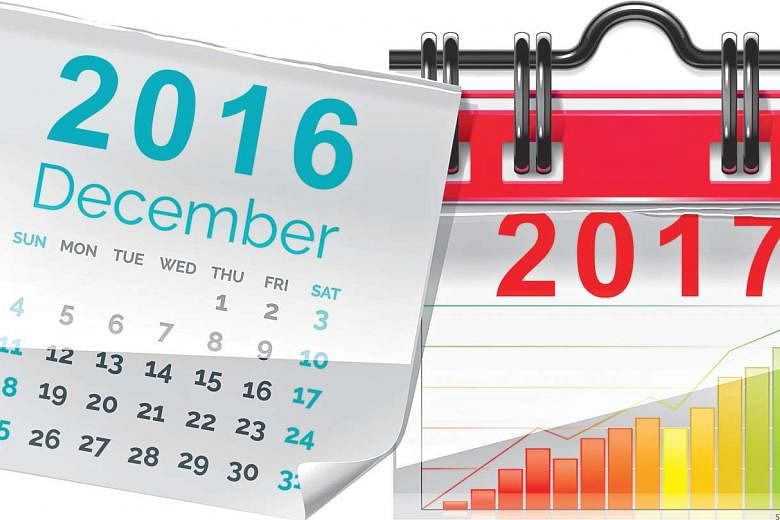With the Christmas lights and decorations up in Orchard Road and the various malls across the island, there is no escaping the festive mood. It is also the time of the year when I tend to become pensive, give thanks for my blessings, and wonder if time has been well spent.
Taking stock of the past 12 months and the decisions I have made will hopefully enable me to make more effective plans for the year ahead and beyond.
Here are some financial planning initiatives that I implemented for my family and me in recent months.
LEGACY PLANNING FOR MY PARENTS
This year marks a milestone in legacy planning for the family. After much deliberation and discussion with my brother, I summoned up the courage to broach the sensitive issue of making a will and a Lasting Power of Attorney (LPA) with my ageing parents. Mum is 76 while dad is 81. The task is difficult as we're a traditional Chinese family and the gloomy subject of death is taboo.

But having written at length on the benefits of these legacy planning tools, I felt that it was time to encourage my parents to make a will and an LPA.
A will provides for the distribution of your assets when you die. It is also a means for you to articulate your wishes while you are still mentally able to do so.
Bear in mind that should you suffer a lack of mental capacity (for example, lapsing into a coma or suffering a stroke, brain injury, dementia or other mental health issues), the will does not apply to financial decisions taken during the period you are alive.
The period you are alive but incapacitated mentally is where an LPA comes in handy. It is a legal document that allows you to plan how your affairs are to be managed when you are still alive but without mental capacity.
With an LPA, you can plan for an uncertain future because you can appoint others (known as donees) to make decisions on your behalf, should you lose your mental faculties. The LPA confers on donees the authority to make decisions concerning the donor's welfare and/or property and financial matters.
I explained to my parents that the LPA should go hand in hand with making a will. Our wishes as stated in the will still apply upon our death, unless there were changes to our estate while we were still alive but without mental capacity.
Hence, it is prudent to align both legacy planning tools so that there is continuity in the person's wishes, regardless of his mental capacity, and at death.
My dad is a bit of a hypochondriac, is sentimental and gets emotional quite easily. He couldn't help crying when he imagined his own death, the first time I brought up the topic of the will. I felt lousy seeing how it had affected him but, thankfully, he recovered from his melancholic mood shortly after.
I drafted their wills in accordance with their wishes, and had them vetted by a lawyer before they were signed in the presence of two witnesses.
And since I had to help my parents complete the LPA forms which I downloaded from the Office of the Public Guardian, my other half and I decided to do up our own LPAs too, besides reviewing our wills.
SWITCHING FROM JOINT TENANCY TO TENANCY IN COMMON
In September last year, I wrote that my pet peeve with my current will is that I can't leave the apartment that I'm living in to my children because it was bought under joint tenancy with my other half.
When you own a property under joint tenancy and one owner dies, his interest in the property automatically goes to the other joint tenants. Assuming we are dealing with two joint tenants who are married and, say, one of them dies, the property will belong solely to the spouse. This is the most common and traditional way for couples to own property, which is the case for my matrimonial home.
But if the couple hold the property as tenants in common, their shares will go to their respective estates on their deaths. This means the tenant's interest in the property can be passed on according to the terms of the will. If there is no will, it is distributed according to intestacy rules.
This year, I made up my mind to do something about my situation. I managed to persuade my hubby to agree to severing the joint tenancy and switching to tenancy in common for the matrimonial home. We engaged a lawyer and did the necessary paperwork.
Although I haven't left my share of the property to my children at this point, at least I know I now have the flexibility to do so.
CENTRAL PROVIDENT FUND NOMINATION
Having written extensively about the Central Provident Fund (CPF) scheme and the new recommendations, I decided to make an appointment - via the CPF website - and visited the CPF Board office to check on my accounts and update my CPF nomination.
My CPF nomination was made a few decades ago and I vaguely recall that I nominated my spouse solely.
Now what happens if my spouse and I nominate only each other and we die at the same time?
Under such circumstances, the older spouse is deemed to have died first. In my case, that would be my other half, so if he goes first, his CPF savings would be paid to my estate.
As I am the younger spouse and I have not nominated anyone else other than my spouse, I would have no nominee since my spouse is considered to have died before me. My CPF savings would then be distributed according to the intestacy laws. Even though I have a will, my CPF savings could not be covered under my will.
In addition, the Public Trustee's Office would charge fees for administering these un-nominated CPF savings. The fees would be taken from my CPF savings, include goods and services tax and cannot be waived. The minimum fee is $15.
To prevent unnecessary "leakage" from my CPF savings, I revised my CPF nomination to include my two children.
REFINANCING MY HOME LOAN
Wary that any looming United States Federal Reserve rate hikes will lead to higher mortgage rates here, I refinanced my housing loan at the start of this year.
I was on a variable mortgage and I decided to switch to one that is pegged to a fixed-deposit rate plus a spread, with the same bank.
The bank is offering me a one-time free conversion to another loan package if the fixed- deposit rate rises.
When the Fed rate hike didn't happen at that time, and the variable mortgage rates dipped, I chided myself for acting too early. But with the recent rise in the Singapore interbank offered rate and home loan rates, partly due to the likely Fed rate hike this month, my move now appears prudent.
LOOKING AHEAD
I plan to scrutinise my insurance policies, particularly my Integrated Shield Plans (IPs). In the light of rising premiums and a reduction in government subsidies, a review of costs and healthcare needs is timely.
I am bracing myself for higher costs in the near future as my IP insurer, NTUC Income, has said that it will raise its IP premiums some time next year. In fact, it has already increased its IP rider premiums.
And that will be fodder for another story.


